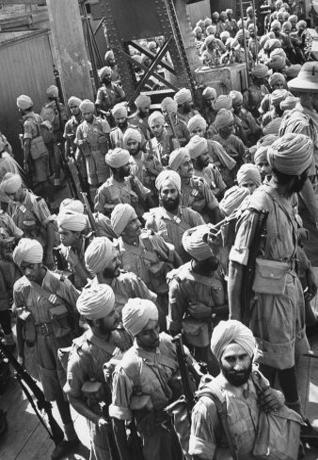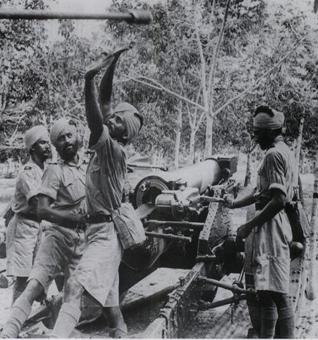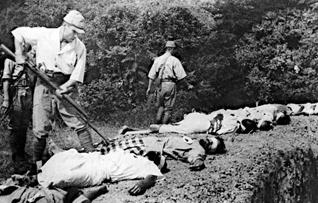History
The Battle of Malaya
by HARCHAND SINGH BEDI
When the history of this titanic struggle comes to be written in mature perspective, none of its many sides will, we believe, excite more wonderment and more ungrudging admiration than the part the Sikhs soldiers have played in it.
As of December 7, 1941, the summary of the strength of the Allied army in Malaya was 86,895 troops. Two third o f the total force were Indian soldiers. Sikhs represented more than 60 percent of the total Indian force.
December 8, 1941 at 12.15 am local time,
Japanese 18th Divisions troops hit the beaches of Sabak-Badang, Kota Bahru and at 4 am (Tokyo Time) Japanese 5th Divisions forces
splashed
ashore unopposed at Singora (now Songkhla) and Patani.
As the first disgorging invaders hit the junction of the Badang and Sabak beaches, they came under withering machinegun fire from pillboxes manned by the Indians. The invaders lost one third of their initial assault forces of 5300 men in fearful beach fighting before annihilating the Indian defenders who died in their pillbox positions, refusing either to withdrawnor to surrender.
An armored train, with 30 men from the 2/16th Punjab Regiment and some engineers, advancing into Thailand from Padang Besar in Perlis reached Khlong Ngae, in southern Thailand, and successfully destroyed a 200 foot bridge before withdrawing back to Padang Besar.
On December 22, the 3/2nd Punjab Regiment engineered an ambush on the Japanese at Grik Road, Perak which resulted heavy casualties on the invaders. The regiment fought fierce delaying actions against the Imperial Guards.
From December 30, 1941 to January 2, 1942, a battle between 3000 British personnel and over 6000 Japanese soldiers erupted. The 11th Indian Division managed to delay the Japanese advance at Kampar for a few days, in which the Japanese suffered severe casualties in terrain that did not allow them to use their tanks or their air superiority to defeat the British.
A Sikh company of the 1/8th Punjab Regiment throw back a furious attack with a classic bayonet charge through massive mortar and machine-gun fire. Only 30 members of the company survive the action but the position held. The Japanese lost more then 500 men here and Japanese commanders, for the first time in the war, consider retreating.
On January 30, 1942, a Sikh Battalion made an ambush on a strong Japanese party north of Kluang, Johor. The Japanese squealed with absolute panic when charged with bayonets. Sikhs captured 250 motor cycles and 150 bicycles when they charged the Japanese positions and machine-gun post. Further details of the attack made by the Sikh Battalion North of Kluang reveals that the enemy casualties numbered at least 400..Two small field guns and many mortars which were tied on their bicycles and tommy-guns were also destroyed.
During the Battle of Muar, members of both the Australian 8th Division and the 45th Indian Infantry Brigade were making a fighting withdrawal when they became surrounded near the bridge of Parit Sulong. The Allies fought the larger Japanese forces for two days until they ran low on ammunition and food. Able-bodied soldiers were ordered to disperse into the jungle, the only way they could return to Allied lines.
The wounded prisoners of war were kicked
and beaten with rifle butts by the Imperial Guards. At least some were
tied up with wire in the middle of the road, machine-gunned, had petrol poured over them, were set alight and, "after their incineration
- were systematically run over, back and forwards, by Japanese driven
trucks." Anecdotal accounts by local people also reported POWs
being tied together with wire and forced to stand on a bridge, before
a Japanese soldier shot one, causing the rest to fall into the Simpang Kiri
River and drown. 110 Australians and 35 Indians were massacred by the Japanese. In
the face of death, the Sikh prisoners sat with dignity.
History speaks for itself on
the valour and bravery displayed by the Sikhs. The never-say-die spirit
of the Sikhs gave us the impetus and inner strength and resilience to
face any challenges that came our way. Sikh soldiers adhered to the
faith and never flinched nor surrendered in the face of adversity.
Photos:
Top - Sikh troops disembarkimg from ships into Malaya.
First from bottom -This photograph was found among Japanese records when British troops re-entered Singapore. It depicts the inhuman brutality practiced by the Japanese on Sikh prisoners of war.
Second from bottom - Sikh gunners in a rubber plantation in Sahum, Kampar Perak.
May 19, 2010
Conversation about this article
1: Jarnail Singh (North Carolina, U.S.A.), May 19, 2010, 5:45 AM.
The British, Australians and Americans have made epic movies about the war in Malaya - but they all depict themselves as heroes ... and not a mention of the Sikh soldiers who bore the brunt of it all! The West is so adept at rewriting history and usurping the glory of others!
2: Surinder (Massachusetts, U.S.A.), May 19, 2010, 11:06 AM.
Am I the only one who sees an irony here? The Sikhs went on to fight for the British, they won Burma, China, SE Asia, Turkey, Iraq, North Africa ... and in Europe. All for the glory of the British and British security and British independence. But when time came in 1947, the same Sikhs could not protect their own land, houses, women, hearth and had to flee from Rawalpindi, Lahore, Gujranwala. Cities of their ancestors became enemy territory instantly. You talk of conquering the world, but could not protect your own earth and women and children? When a Sikhni became Fatima Bibi, where was this mighty Sikh army, full of unrelenting courage and valour?
3: Gurjender Singh (Maryland, U.S.A.), May 19, 2010, 1:39 PM.
I believe Surinder ji is looking from the results point of view for Sikhs. When other parties (all the countries including India for which Sikhs fought) became selfish and not thankful for the sacrifices of Sikhs. No one can stop them. These people are, to use a Punjabi word - akiratghan. A good recent example will be the 1984 Sikh holocaust. These people keep on changing history. Unless and until Sikhs bring the truth out to the world through the media, movies and books and by stopping to fight amongst themselves, no one can help. Sikhs have all the resources but they need to use them in this direction.
4: Chintan Singh (San Jose, California, U.S.A.), May 19, 2010, 3:31 PM.
I have a similar question as Surinder ji. What has happened to us in the recent past? Where have we lost our spirit and saroop? We are the sons and daughters of Guru Gobind Singh and our ancestors fought for Malaya, Singapore, Britain, France, Scotland and India but we could not protect ourselves in 1947 and 1984? Forget about protecting ourselves, despite this glorious heritage, why did we become so hostile to our co-citzens? Furthermore, today when the whole world is becoming globalized, we are becoming isolated and we cannot even keep our own youth motivated with our own history and preserve our heritage? What has gone wrong with us? Where is our spirit of Chardi Kalaa? How do we re-align ourselves with our Guru?
5: Harjit Singh (Perth, Australia), May 20, 2010, 7:56 AM.
Surinder, Sikhs were not there in 1947? Are you joking, mate? I think you might need to read up on your history because you are just about to learn something! Out of 121 patriots hanged for fighting in India's freedom struggle, 93 were Sikhs. Of the 2626 awarded life-imprisonment 2147 were Sikhs. Of the 1300 martyred in Jallianwala Bagh, 799 were Sikhs. Considering that the Sikhs were hardly 1.5 per cent of the total population of India at the time, their sacrifices amounted to 90 per cent of the total sacrifices made by ALL Indians. Where were they, Surinder? They were fighting openly and dying openly, but when the time came for the Sikhs to be given equal status, the politicians looked the other way and rewrote the history to not include these facts. We were betrayed!
6: Gurjender Singh (Maryland, U.S.A.), May 20, 2010, 11:56 AM.
Again, Surinder ji, please watch the movie GANDHI which was released almost three decades ago. That movie shows the scene of the Jallianwala Bagh Massacre. As Harjit Singh mentioned, out of 1300 killed there, 799 were Sikhs. But the movie dilutes - and at times completely ignores - the Sikh involvement in that incident, and in others depicted throughout the movie. History is being changed in front of our very eyes and our 'leaders' are doing nothing, because all they want is personal power.
7: Surinder (Massachusetts, U.S.A.), May 20, 2010, 1:40 PM.
The comment section of articles is too limiting a place to put forth an argument. (Maybe sikhchic.com can allow me to write an article?) [Editor: We're always open to considering articles by our readers.] Forget about 1984, let us not clutter the issue here. Of course, I know that Sikhs were disproportionately higher in the number of freedom fighters. But also note that a very large number of Sikhs enrolled in the colonial army. Not once, but twice - World War I & II. They essentially fought somebody else's wars. Wars that had little, if any, to do with issues that mattered to them. The result is that hundreds of thousands of Sikhs were soldiers for the British crown, defending Britain and its interests. Within two years of the end of World War II, Partition of India an d Punjab took place. Muslim mobs on the streets cleansed Western Punjab and drove the Sikhs out. They took over our gurdwaras, including the holiest of our holy places like Nankana Sahib. About a million people were killed; 10 million were forced to quit their homes; hundreds of thousands of women were brutalized. Where were these brave soldiers at that time? Those who had shown gallantry in Malaya, Singapore, Italy, Belgium, North Africa, were nowhere to be seen when Rawalpindi and Lahore had Sikhs lying butchered on the streets. I am sorry to have posed a question which has made many uncomfortable. But ask yourself, what good is this bravery? If people like the British have fooled you, who is the fool, really?
8: Dya Singh (Melbourne, Australia), May 21, 2010, 12:50 AM.
I commend Harchand Singh Bedi on the effort he has put into uncovering all this amazing proud history of Sikhs in the old Malaya. I met Harchand a few days ago and was amazed at the wealth of photographs and information he has on Sikh 'military' history. I have also read some of the letters above ... it is up to us (Sikhs) to keep highlighting the 'qurbaani' of Sikhs around the globe, immaterial whether they fought "someone else's" war, etc. The fact is they carried out deeds of valour, of daring, of sheer bravery - to inspire our generation and future generations through greater knowledge of our proud heritage. Harchand also holds impressive exhibitions of Sikh military history. His exhibition is soon (in September) to be held at various venues in the United Kingdom. I am hoping to get him to do similar exhibitions in Australia where we 'know' that Sikhs fought alongside the Australian/ New Zealand forces at places like Gallipoli (Turkey, WW1) which has led to Australia's Anzac Day celebrations and commemoration in April every year. This man has a great exhibition which every Sikh youth, child and elder should see. Shabash, Harchand, for all your efforts.
9: Yashdeep Singh (Ahmedabad, India), May 21, 2010, 9:45 AM.
I think that the main reason for Sikhs being killed in Jallianwala Bagh, and again in '84, is our loyalty to our country. And yes, we should be loyal; doing bad to someone is not in our blood. Sikhs actively took part in WW1 and WW2 because we knew that it was to protect the soldiers' "karmabhoomi". We sometimes couldn't protect ourselves because of lack of unity. I remember that when the shoe-throwing issue of S. Jarnaul Singh was in the news, at that time I saw sum Sikhs sitting behind Jagdish Tytler as his supporters. It is a known fact that the whole Sikh world is against Tytler, so for what reason were those Sikhs doing there? Doesn't the lack of unity seem to be here?
10: Ian Grantham (Sydney, Australia), November 23, 2010, 8:27 AM.
I can understand how frustrated Sikhs may be. One day I would like to make an actual account of what happened day by day in the Second World War, and NOT from a special perspective - the truth would be absorbing and as to yet, I think, remains unpublished! As an Australian, I am proud of our achievements and upset with the preponderance of U.S. material which distorts the facts. Many Pacific battles were fought and won by Aussie personnel but the U.S. got the credit in order to keep them in the war - I feel the Sikhs and other Indians have in the same way been left out of the accolades that are rightfully theirs! P.S. No one believes what you say if you are not from the U.S.A., so we NEED contemporary facts to back up what we say - e-mail me if you would like and let's start to build a machine that gives facts and truth and dispels popular myth!





